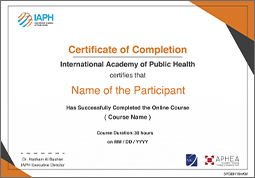Basic Epidemiology
Description
This course is designed to introduce participants to basic epidemiological concepts and methods and provide them with core skills in epidemiology, that is with working knowledge of the acquisition, analysis, and interpretation of information about disease occurrence in populations.
Learning topics will include concepts of causality, measurement of geographical and temporal distribution of diseases and their outcomes, risks, biases, and study designs (descriptive, case-control, cohort and intervention studies). Participants will gain practical experience in planning epidemiological research studies along with the appraisal of epidemiological literature.
Learning Outcomes
- Discuss the role of epidemiology within the broader field of public health and identify its relationship to the fields of medicine, environmental health, social and behavioural sciences and health policy
- Demonstrate a sound knowledge of basic concepts and methods of epidemiology
- Use descriptive epidemiological concepts such as person, time, and place to describe the distribution of disease
- Calculate and interpret epidemiological measures taught in the course (e.g. incidence, prevalence, risks, odds ratio, etc.)
- Plan and design public health research
- Demonstrate the application of epidemiological research for the formulation, implementation and evaluation of health policies
- Introduction to Epidemiology.
- Descriptive Epidemiology.
- Introduction to Biostatistics Part I.
- Introduction to Biostatistics Part II.
- Public Health Surveillance.
- Data Analysis and Displaying.
- Outbreak Investigation Part 1.
- Outbreak Investigation Part 2.
- Writing outbreak investigation Report.
- Data Quality.

Duration:
30 Learning Hours
Accredited By:


Certificate

Are you interested in the course?
Get notified once the course is open by clicking on
Basic Epidemiology
Thank you for registering your interest! We appreciate your enthusiasm for this course. As soon as it becomes available, we will reach out to you with all the details. Stay tuned!